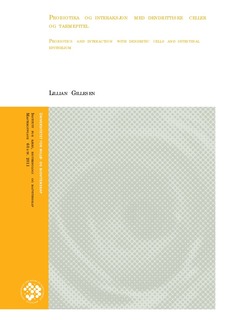| dc.description.abstract | Fordøyelsessystemet utgjør en elementær viktighet for vår helse og velvære. Tarmoverflaten består av et enkelt lag med epitelceller som skiller innholdet i tarmlumen fra kroppens andre vev. I tarmen finnes det ulike typer celler, som blant annet står for absorpsjon av næringsstoffer. Tarmepitelet blir hele tiden utsatt for ulike mikroorganismer, både gjennom tarmens egne bakterier og gjennom kosten som inntas. Immunsystemet må skille mellom eget og fremmed, og mellom fredelige og sykdomsfremkallende mikrober for å unngå sykdommer som matallergi, kronisk inflammatorisk tarmsykdom og tarmkreft.
Dendrittiske celler har svært viktige funksjoner ved igangsettelse av immunrespons i tarm. Dendrittene på de dendrittiske cellene kan forlenges og trenge mellom epitelcellene slik at de kommer i direkte kontakt med innholdet i tarmlumen. Dendrittiske celler vil kjenne igjen fremmede mikroorganismer. De vil da modnes og migrere til lymfeknuter, hvor de vil stimulere T-celler. Man ville i denne studien undersøke om dendrittiske celler eksponert for patogene, probiotiske og kommensale Enterococcus faecalis stammer, induserte til ulik ekspresjon av overflatemolekylene og modningsmarkørene CD80 og CD83. De ulike E. faecalis stammene viste ingen forskjeller i evnen til å modne dendrittiske celler. Kondisjonert medium fra dendrittiskeceller eksponert for probiotiske, kommensale og patogene bakterier ble påført den basolaterale siden av polarisert tarmepitel. Tidligere resultater fra en transkriptomanalyse (mikromatrise) hadde vist en kraftig nedregulering av fibrinogen. Man ville verifisere dette ved å bruke real time-PCR, men kunne ikke finne noen markant regulering av uttrykt fibrinogen. The gastrointestinal tract has a fundamental impact on our health and well-being. The intestinal surface consists of a simple layer of epithelial cells that separates the intestinal luminal content from the other tissues in the body. In the intestine, you can find many different cell types that among other things are responsible for absorption of nutrition. The intestinal epithelium is continuously exposed to different microorganisms, both through the intestines own bacteria and trough food ingested. The immune system have to segregate between its own and foreign material, and between unharmful and disease promoting microorganisms to avoid diseases like food allergy, intestinal bowel disease and intestinal cancer.
Dendritic cells have a central function in the initiation of an immune response in the intestine. The dendrites on the dendritic cells can extend between the epithelial cells, to get in contact with the content of the intestinal lumen. Dendritic cells will recognize foreign microorganisms and subsequently mature and migrate to lymph nodes, where they will stimulate T-cells.
In this study, we wanted to investigate if dendritic cells exposed to a pathogen, a probiotic and a commensal bacteria strain, all E. faecalis strains, induced to differences in the expressions of the surface molecules and maturation markers CD80 and CD83. The different E. faecalis strains didn’t show any differences in their ability to mature dendritic cells.
Conditioned medium from dendritic cells exposed to probiotic, commensal and pathogen bacteria strains, was applied on the basolateral side of the polarized intestinal epithelium. Earlier results from a transcriptome analysis (microarray) had shown a strong down-regulation of fibrinogen. We wanted to verify this by using real time-PCR, but could not find any pronounced regulations of expressed fibrinogen. | en_US |
